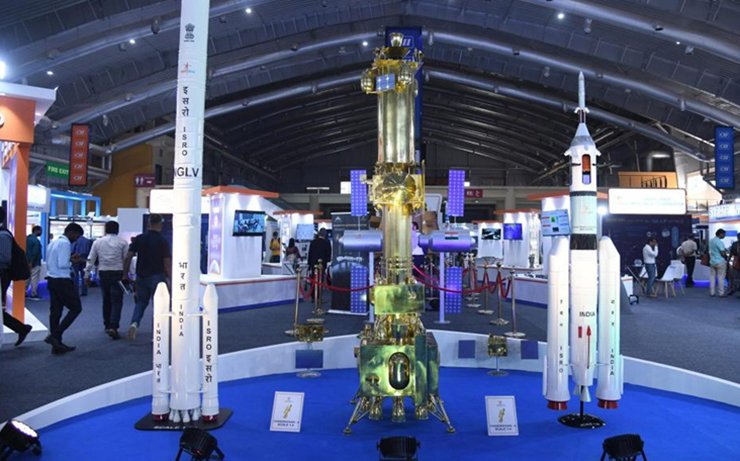New Delhi: It was three days of treat for the afficiandos of space technology as the eighth edition of three-day Bangalore Space Expo 2024 (BSE 2024) was held from September 18 to September 20.
What is of significance is that with the push from Prime Minister Narendra Modi, India has privatised space launches and is targeting a fivefold increase in its share of the global launch market, which some expect to be worth $47.3 billion by 2032. This increased private sector participation would help to generate employment, enable modern technology absorption and make the sector self-reliant. It is expected to integrate Indian companies into global value chains. With this, companies will be able to set-up their manufacturing facilities within the country duly encouraging ‘Make In India (MII)’ and ‘Aatmanirbhar Bharat’ initiatives of the Government.
In this background, the BSX 2024 which was held at the Bangalore International Exhibition Centre (BIEC) gave visitors an opportunity to see cutting-edge innovations, exciting space technologies and future of India’s space.
Nothing could be more apt than what Dr S. Somanath, Secretary of Department of Space and Chairman, Space Commission said, “Times have changed. We are capable of building the best equipment. The best devices and the best rockets in India.”
With over 100,000 visitors attending the three-day BSX 2024, the event saw participation by over 250 delegates, space companies from over 250 and pavilions of over ten countries, shows the interest in space technology and increased private funding, technological advancements, and public sector interest. There’s a renewed push to explore beyond. Declining launch costs and rising public interest are propelling this industry to new heights, offering a galaxy of opportunities for investors.
India’s space sector has seen tremendous growth over the past decade. India’s advances in space programs have been highly remarkable, with vigorous and determined efforts by ISRO. Taking the vision of the Government of India in enhancing private sector participation in the space sector, the Confederation of Indian Industry (CII), in association with the Indian Space Research Organisation (ISRO), has been organising the Bengaluru Space Expo 2024 (BSX), a Biennial International Exhibition and Conference since 2008.
From the humble beginnings of transporting rocket parts on bullock carts to the proud achievement of launching a record number of satellites in a single mission, India has proven itself as a trailblazer in space exploration. Until recently, India’s space sector could broadly but in no way exclusively be divided into two major domains: commercial and research. The Mars Orbiter Mission (MOM), which made India the fourth nation to reach Mars, and the Chandrayan-3 Mission to soft launch on the south pole of the lunar surface, are purely research initiatives for space exploration. On the other hand, launching foreign satellites for communication, navigation, and resource survey/management are commercial space activities.
The Indian Space Research Organisation (ISRO), formed on August 15, 1969, is the country’s official space agency. While pursuing space science research and planetary exploration, ISRO has led and defined the nation’s space industry and economy with 124 spacecraft missions, 432 foreign satellite launches, 98 launch missions, and much more. The Bengaluru-headquartered organisation is gearing up for Gaganyaan, India’s first manned mission to space. Several Non-Government Entities (NGEs) aid ISRO as vendors and/or suppliers.
A report by the World Economic Forum and McKinsey estimates the size of the global space industry to be $630 Billion in 2023. It is expected to grow 9% per annum and reach $1.8 Trillion by 2035. The private sector plays a defining role in driving innovation and access through large-scale investments, while non-space private sector partnerships with space players continue to expand.
In a landmark effort to engage and promote private entities in the space sector, the Government launched the Indian Space Policy 2023. There are 189 DPIIT-recognised space technology startups in India, and the space startups have garnered investment worth $124.7 Million during March-December 2023. The policy enables NGEs to engage end-to-end in all domains of the space sector, making startups a lucrative investment option for investors. Alphabet Inc. became one of the first to capitalise on the lucrative potential with an investment of $36 Million in a Bengaluru-based satellite imaging startup called Pixxel. As the space sector flourishes with emerging startups, established NGEs like Dhruva Space, SatSure, Skyroot, and more are also expanding the remit of their operations and research under the policy.
India’s space economy, valued at $8.4 Billion in 2023, currently accounts for 2-3% of the global space economy. But it is estimated to grow to $44 Billion by 2033. The private sector can play a critical role in realising this and BSX 2024 provided the appropriate platform to boost India’s space development.
To facilitate participation from the private sector, the Department of Space (DoS) established the Indian National Space Promotion and Authorisation Centre (IN-SPACe). Though funded by the DoS, IN-SPACe is an autonomous, single-window, nodal agency for all space sector activities of NGEs. It serves as an authorisation and clearance agency for space launches, provides infrastructure support for launch pads, monitors and facilitates the procurement and trade of satellites, enables the use of DoS facilities, and more. IN-SPACe also offers technical expertise and assistance to NGEs and handholds them through the process by sharing technologies, best practices, and products.

Meanwhile, NewSpace India Limited (NSIL), serving as the commercial arm of ISRO under DoS, helps NGEs commercialise their space technologies and platforms. It facilitates manufacturing, leasing, procuring, and trading space components, technologies, and other assets for global markets. It also facilitates space services offered by ISRO and now private companies and consortiums to international and global agencies.
In a more recent and direct reform, an amendment to the FDI policy allows up to 100% foreign direct investment in manufacturing and procuring satellite systems. The satellite sub-sector of the space industry has been distinguished into three different segments with defined foreign investment ceilings. Launch vehicles and their associated products/services can have up to 49% FDI. Activities like operation, data products, and ground and user segments can receive up to 74% FDI. And up to a 100% FDI for the manufacture of satellite components, sub-systems, and ground and user segments of the same.
India’s space sector has always promoted domestic manufacturing and innovation. These principles have held the nation’s space economy in good stead, with the NSIL reporting an annual turnover of INR 28.42 Crore in FY 22-23 alone. The space economy is on a sharp upward trajectory with the influx of space-tech startups and other NGEs. The IN-SPACe has already signed 51 MoUs with NGEs to actualise and support the manufacture of launch vehicles and satellites. Other notable successes include the commercial launches of LVM3 & PSLV and the successful launch of Aditya-L1 aboard PSLV C57 to observe the Sun, cementing India’s place in the global space industry for research and commerce.
The space industry has a crucial role in implementing innovative solutions in several sectors, such as telecommunication, healthcare, agriculture, defence, and others. India’s space sector is at a pivotal juncture. With a rich history of innovation — even at a cost less than Hollywood movies — a booming private sector and a supportive regulatory environment, the nation is poised for a significant leap forward.
By harnessing the collective potential of ISRO, NSIL, IN-SPACe, and its thriving startup ecosystem, India can not only become a major player in the global space economy but also unlock transformative applications for its citizens and the world. The final frontier beckons and India appears well-equipped to answer its call. The space startup ecosystem has flourished, with 189 startups in 2023, receiving $124.7 million in funding. With favorable policy changes, including the Space Policy 2023 and upcoming legislation, India is poised to emerge as a global leader in the space sector, offering new avenues for investments and technological advancements.
As a leader in the space technology domain, India understands the importance of staying at the forefront of innovation and collaboration. The Bengaluru Space Expo 2024 served as a premier platform for industry leaders, innovators, and enthusiasts to come together, exchange ideas, and explore the latest advancements in space technology.
– The writer is a senior journalist and media consultant. The views expressed are of the writer and do not necessarily reflect the views of Raksha Anirveda.






